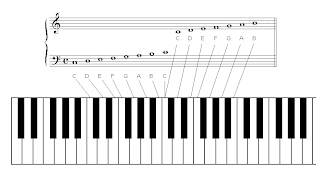It's only natural to be a little bit overwhelmed when you first start learning to play the piano. The challenges to becoming a truly competent pianist,are something that most people never consider. But that certainly doesn't mean that it's impossible.As a matter of fact,there are two very different ways of approaching piano learning.It all depends on what kind of pianist you want to be.
If you're serious about getting really good at piano going the classical route would be the best option. An understanding of music theory and the skill of reading music is essential, if you want to have the ability to play a variety of music. Learning the piano is like moving to a foreign country. You'll only be able to get so far without being able to speak the native language. You wouldn't move to Paris without learning at least a few basic words and phrases in French, would you? It's the same way with the piano or any other instrument on the face of the planet. You can't expect to progress to a reasonable level of piano skill without the ability to read music.
Although there are some gifted individuals,like Mozart,who have the ability to play perfectly without instruction, you obviously don't fall into the prodigy category.And if you want to be able to play classical music, learning to read music is mandatory.
On the other hand, if all you want to do is play your favorite songs, there is a faster and easier way of going about learning to play piano. The other style is called chording. Every song ever written is based on melody and rhythm. There are 12 major and 12 minor keys in music. Classical piano is built on running scales within each of these keys.The advantage of using chords is that it allows you play music without considering the scales.
Almost every piece of sheet music includes the specific notes required to play the song as it is written,including the keys to the chords that the scales are built around. In other words, just by learning how to play all the chords, you can make it sound like the song.Without actually having to play the song precisely the way it was written.
You can only hope to advance to a decent level of piano skill by acquiring the ability to "sight read", even though chording is more easily learned. Again, it all depends on what kind of pianist you want to become. The principal thing to keep in mind is consistent, regular practice. In a quiet, well lit location, if possible. There will be times, obviously, when the last thing you feel like doing is practicing. But only by practicing will you get to Carnegie Hall, or the piano level of your dreams.
If you're serious about getting really good at piano going the classical route would be the best option. An understanding of music theory and the skill of reading music is essential, if you want to have the ability to play a variety of music. Learning the piano is like moving to a foreign country. You'll only be able to get so far without being able to speak the native language. You wouldn't move to Paris without learning at least a few basic words and phrases in French, would you? It's the same way with the piano or any other instrument on the face of the planet. You can't expect to progress to a reasonable level of piano skill without the ability to read music.
Although there are some gifted individuals,like Mozart,who have the ability to play perfectly without instruction, you obviously don't fall into the prodigy category.And if you want to be able to play classical music, learning to read music is mandatory.
On the other hand, if all you want to do is play your favorite songs, there is a faster and easier way of going about learning to play piano. The other style is called chording. Every song ever written is based on melody and rhythm. There are 12 major and 12 minor keys in music. Classical piano is built on running scales within each of these keys.The advantage of using chords is that it allows you play music without considering the scales.
Almost every piece of sheet music includes the specific notes required to play the song as it is written,including the keys to the chords that the scales are built around. In other words, just by learning how to play all the chords, you can make it sound like the song.Without actually having to play the song precisely the way it was written.
You can only hope to advance to a decent level of piano skill by acquiring the ability to "sight read", even though chording is more easily learned. Again, it all depends on what kind of pianist you want to become. The principal thing to keep in mind is consistent, regular practice. In a quiet, well lit location, if possible. There will be times, obviously, when the last thing you feel like doing is practicing. But only by practicing will you get to Carnegie Hall, or the piano level of your dreams.
About the Author:
Lawrence Collins is a professional pianist who enjoys helping others advance their musical skills. More musical resources can be found HERE.

No comments:
Post a Comment